Can Childhood Apraxia Continue Inot Adulthood
"One of the hardest things in life is having words in your heart that you can't utter."
– A surprising quote from James Earl Jones, one of the iconic voices of our time. James Earl Jones stuttered as a child and took acting lessons to help, but as he says, he will always be a stutterer.
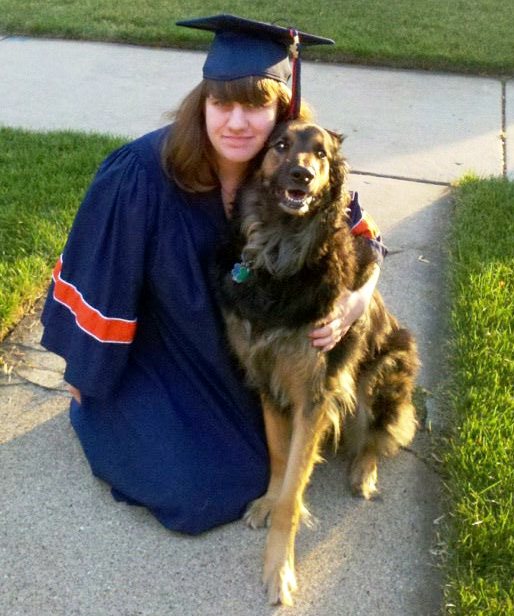
Kari is a teenager who grew up with apraxia
Kari is a teenager who grew up with apraxia. She has been in speech therapy for just about her entire life and is still in speech therapy today. She started complimenting her therapy with nutritional strategies at 17 years old.
Kari at 17 years old April 20, 2012
Kari at 18 years old May 4, 2013
To know a bit more about Kari, the following essay was written by Kari last year when she was 16 years old and will give you a better idea of what life has been like for this powerful young lady.
"I'm 16 years old and I grew up with apraxia. Im still in speech therapy and misunderstood every once in awhile. I just finished up my 10th year of speech therapy (wow, over 25 speech therapists) Now that I am older I want to raise awareness about apraxia. I wanted to start a support group for teens and young adults like me"
"Ever feel lonely? Like you don't belong? An outcast? Chances are that you aren't. If you look around you are bound to find a support group, school program, coworker, neighbor, or stranger that's going through or has been through what you have. Whether it's blindness, deafness, autism, gayness, divorce, death, foster care, bullying/suicide homelessness, immigration, or cancer, you are going to run into someone that you can relate to.
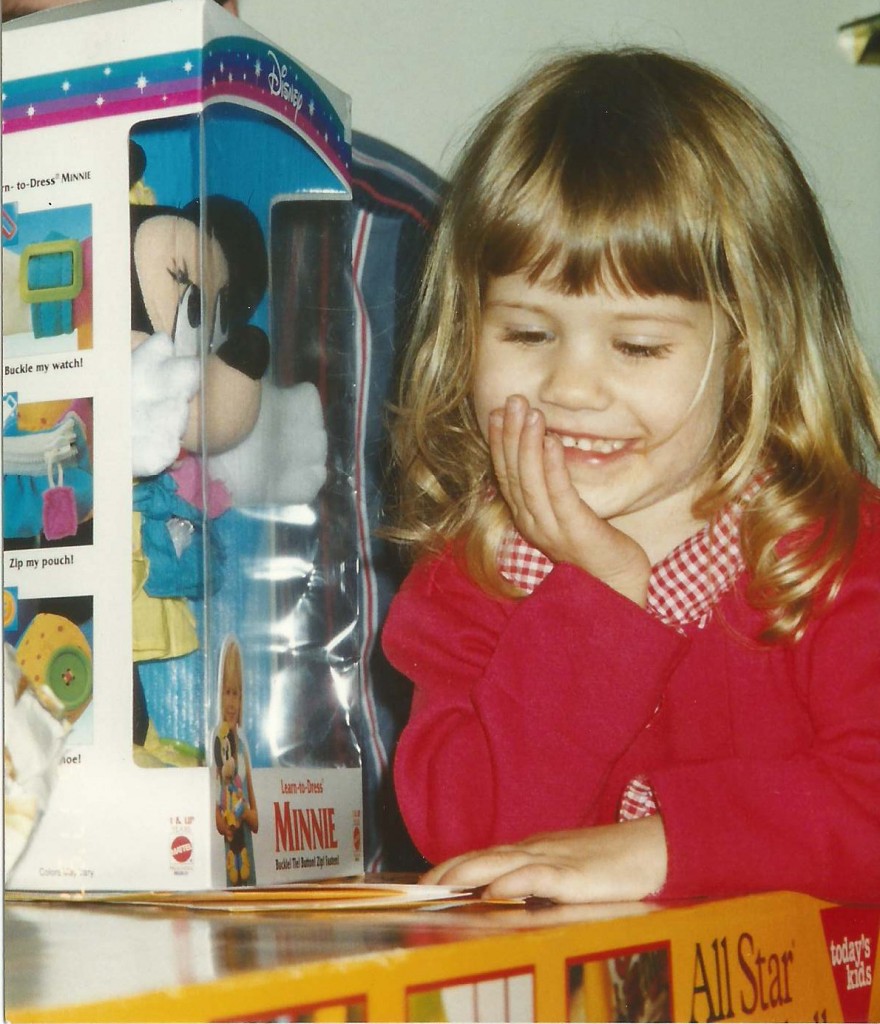
Kari at her 3rd birthday party
But, what if you can't find anyone like you? Welcome to my world of Apraxia.
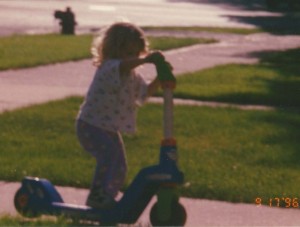
Kari aged two and a half years old
When you have this speech disorder you pretty much are all alone. Growing up I never really cared that I had Apraxia. I knew I had a speech problem and had to go to speech therapy, but it just didn't bother me. My family never really talked about it, and I never asked questions. It just was as much a part of my life as being right or left handed is for others.
As I grew into my teens and started interacting more and more with people other than those that I grew up with (highschool, store workers, etc), going to school with many since kindergarten, I realized that my speech was more than just part of my life. It was a part of my life that others didn't know about. People would ask me why
I never talked or what country I was from. They would treat me as if I was deaf or stupid. It was like people never even heard of a speech problem before.

Kari aged three
That's when I started to open my eyes to the world. I had got to know hundreds of people in my life with sports, daycamp, girls scouts, ccd, elementary and high school, and family and friends. I had ran into thousands more people at blockparties, stores, and train stations. I never once heard anyone that sounded like me though.
It didn't take long for Apraxia to become my new interest. I started Googling news articles, watching videos on YouTube, looking at websites, joining online groups, and reading blogs. There wasn't that much information out there, but in my research I found out two major things: Apraxia is pretty rare and all the information I found out online was done by parents of young children with Apraxia. No wonder why I never met anyone like me and people would think I had an cool accent instead of a speech problem.
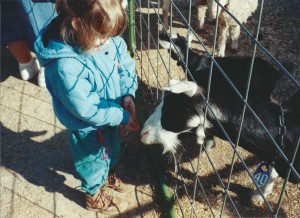
Kari aged three and a half years old
When I was 16 I realized that I had never meet anyone at all like me, and by the looks of things, I never will. I decided to change that. I joined an online group, ChildrensApraxiaNet. The group owner, Lisa Geng, told me that I was the first teen to contact their group in its 10 year and more than 10,000 member history. From there I helped create the first support group for people who have Apraxia, an online group called YoungAdult Apraxia/Dyspraxia Association (YADA). The main YADA group is now located on Facebook here.
It's not a group for parents to talk about their child's progress, or for therapists to share therapy ideas, but for other teens and adults that grew up with Apraxia, and other speech problems, like me.
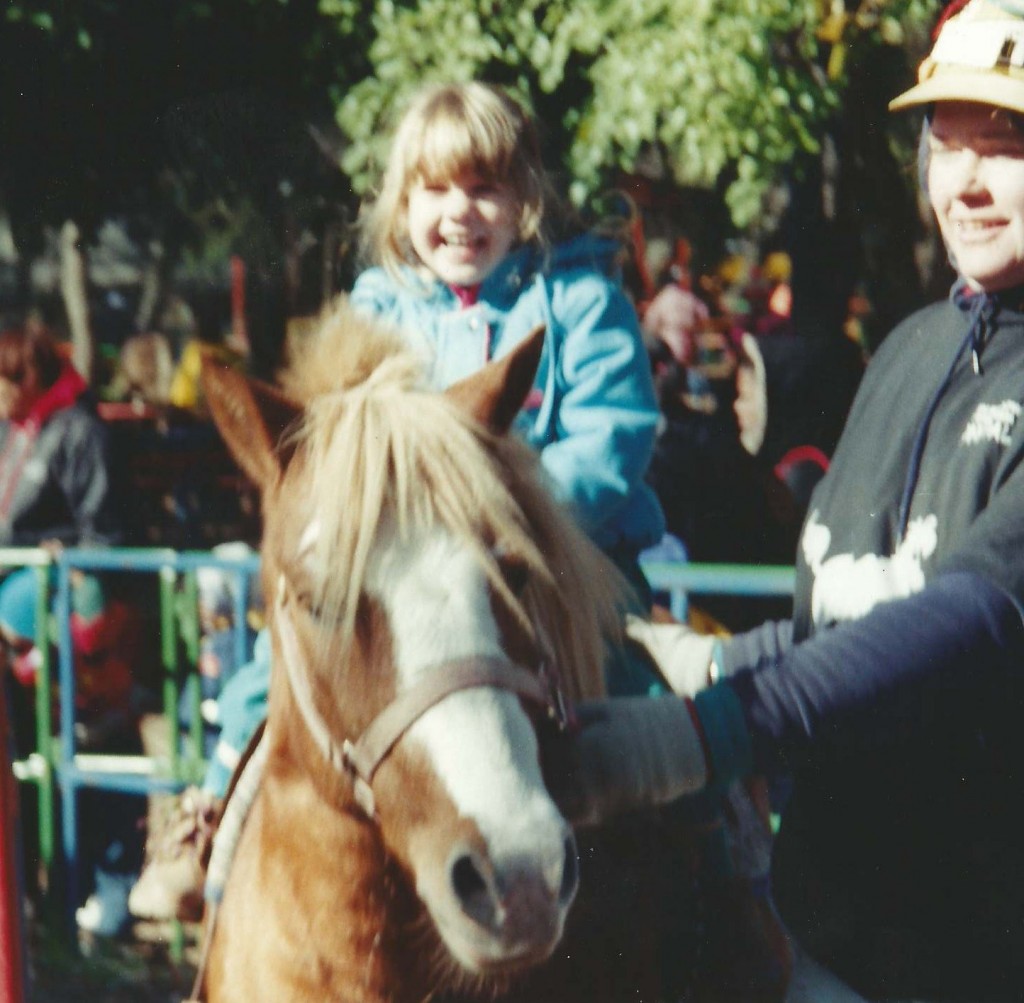
Kari aged three and a half years old
The group was created in April 2011 and isn't huge (yet) but it gives a place for us to be able to relate to someone else like us. The group consists of people in their teens and twenties, some had met others with Apraxia in the past, but for most of us this group gives us the opportunity to connect and talk to someone else that has Apraxia for the first time. The creation of this group has helped me feel more confident about the future as others write about college, jobs, and their speech.
~Kari aged 16 years old
Kari's reflections on therapy and testing
"I only had speech therapy through the school for preschool and kindergarten, I wasn't in private therapy as well until 1st grade. For 1st, 2nd and 3rd grade I had speech therapy two times a week for 30 minutes. From 4th grade up till now it's been 60 minutes one time a week.
I found an old IEP, it had my scores for how I did on a test called the Brigance Diagnostic Inventory of Early Development that was done the month I turned 5. I scored 5.0 years for readiness, 5.9 for recites alphabet, and the other 11 categories I was 6.0-6.9 years
Then the Carolina Assessment for Preschoolers with Special Needs said I scored at 3.5 years for interpersonal skills."
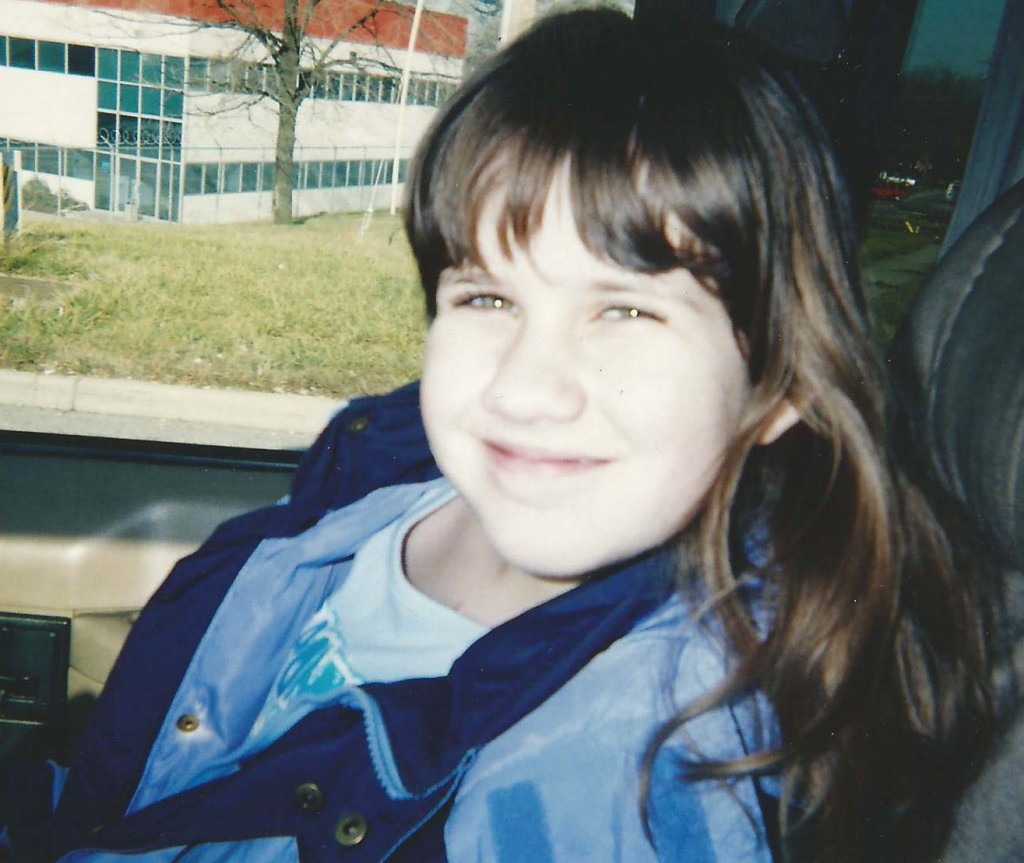
Kari aged ten years old
About YADA a support group for teens and young adults who grew up with apraxia started by Kari with help from Lisa Geng
YADA (Young Adult Dyspraxia/Apraxia Association) is a new support source to bring a voice to the growing number of teens and young adults who grew up with a diagnosis of apraxia, dyspraxia, dysarthria, stuttering, autism or another communication impairment.
From our teen moderator Kari "I'm 16 years old and I grew up with apraxia. Im still in speech therapy and misunderstood every once in awhile. I just finished up my 10th year of speech therapy (wow, over 25 speech therapists) Now that I am older I want to raise awareness about apraxia. I wanted to start a support group for teens and young adults like me"
YADA is an affiliate support group of The Cherab Foundation a world-wide nonprofit organization working to improve the communication skills and education of all with speech and language delays and disorders.
YADA is committed to assisting teens and young adults by providing a place to turn where one is never alone. Here you can share, ask for support, advice, therapeutic approaches that are found to be successful. YADA is a place to turn to find online friends that will understand you, and a place for you as a teen or young adult to share directly with each other.
We will also be a strong voice to share that speech impairments are not just "childhood" conditions (so just call it apraxia!)
If you represent a teen or young adult who does not have the ability to write for themselves yet, or as a parent or professional you have a question for the teens and young adults, please feel free to join in discussion as well!
This is a private group, please also join us at our public Facebook group at apraxia.org or our YADA to help awareness!
See this page if you want to learn more about NV, and here if you wish to support our efforts to raise money for research.
JUST CALL IT APRAXIA (Not Childhood Apraxia of Speech or CAS)
Here is why in a letter to ASHA from Kari, Lisa Geng President of Cherab, co author of The Late Talker and mother of a teenager with apraxia, and Jeanne Buesser President of the Apraxia Network, author of He Talks Funny, and mother of a teenager with apraxia
To Lisa Rai Mabry-Price, M.S., CCC/SLP -ASHA
From Lisa Geng;Parent advocate, Cherab Foundation President, CoAuthor The Late Talker
Copied Jeannie Buesser Parent advocate, Apraxia Network of Bergen County, Author He Talks Funny
Copied Kari O'Neill 17 year old who grew up with apraxia, Founder of YADA Young Adult Apraxia Dyspraxia Association
"One of the hardest things in life is having words in your heart that you can't utter."
– A surprising quote from James Earl Jones, one of the iconic voices of our time. James Earl Jones stuttered as a child and took acting lessons to help, but as he says, he will always be a stutterer. Yet childhood stuttering is only used for those children who have a developmental/childhood stutter. Meaning…they will outgrow it.
Hi Lisa and to whomever else this may concern,
Thank you so much for the generous amount of time you took to speak toJeanne Buesser and I today regarding the terminology Childhood Apraxia Of Speech or CAS.
The following is a brief outline of what we discussed as to why this name must be removed for advocacy reasons for teens and young adults who grew up with apraxia. Kari who is copied on here has provided permission to share her essay (see below) as well as video http://www.youtube.com/watch?v=s4Y_san1_fw which you have permission to share to help raise awareness about this issue with others in ASHA.
We are writing to request formally to stop using terminology in a diagnosis name such as developmental or childhood which ends up insulting and ostracizing those children who grow to become teens and adults.
In using ASHA's own statement on CAS as to why the word developmental should no longer be used, which we all support, we just replaced a few words but the meaning is the same. The word childhood could be a practical thesaurus word for developmental.
"One consideration is that parents and professionals who care for children diagnosed with apraxia have requested that the words childhood or developmental which mean the same thing, not be used in a classification term for this disorder. Inclusion of either of these word is reportedly interpreted by service delivery administrators as indicating that apraxia is a disorder that children "grow out of" and/or that can be serviced solely in an educational environment"
Here are key points
1. Unless there are guarantees that a child will overcome apraxia enough for it not to affect them in teen and adult years we do not want to add insult to injury by having this diagnosis name (Childhood Apraxia of Speech) put onto permanent school and insurance documents when one can just write "apraxia". The diagnosis will remain on permanent records and whether confidential or not, a teacher who has a speech impaired teenage HS student in her class may already have some negative stereotypes about that student's abilities. Having the diagnosis "Childhood Apraxia of Speech" after a certain age can imply there is some sort of mental retardation. Please read some of Dr. Rosenthal's extensive research in this area of perception/reality
2. There isn't enough research to know for sure there is a difference between adult and childhood onset of apraxia. Perhaps they are one and the same. For example there are numerous cases reported of children regressing after normal developmental, just as they do for autism. Some theories point to environmental triggers or assaults, but regardless nobody yet knows why there is such a large and growing number of communication impaired children.
3. If it is found there is a difference, or you just wanted to differentiate between adult and child onset Apraxia I and Apraxia II could be used instead which is benign -or type 1 and type 2 as in diabetes.
4. Individuals with apraxia break down the longer and more complex the utterance, so there is no reason they should be given one of the longest diagnosis names ever.
5. The terminology apraxia and dyspraxia is used interchangeably here in the US as well as internationally. Adding Childhood Apraxia of Speech to the mix is making an already confusing mish-mosh of names even more confusing to those we are trying to outreach to.
6. One in 60 children today I believe is the latest stats for children with autism. Many of these children with autism today also have been diagnosed with apraxia. To now have those parents say instead their child has autism and Childhood Apraxia of Speech is a bit absurd as one can tell if it's a child by looking at them.
We have a few other points but wanted to keep this brief and allow you the chance to share this with others. As stated earlier we do hope that there can be something worked out on behalf of those of us like me and Jeannewho have teen children that grew up with apraxia and are still apraxic -and like Kari who is a teenager with apraxia who is still impaired in speech and still in therapy.
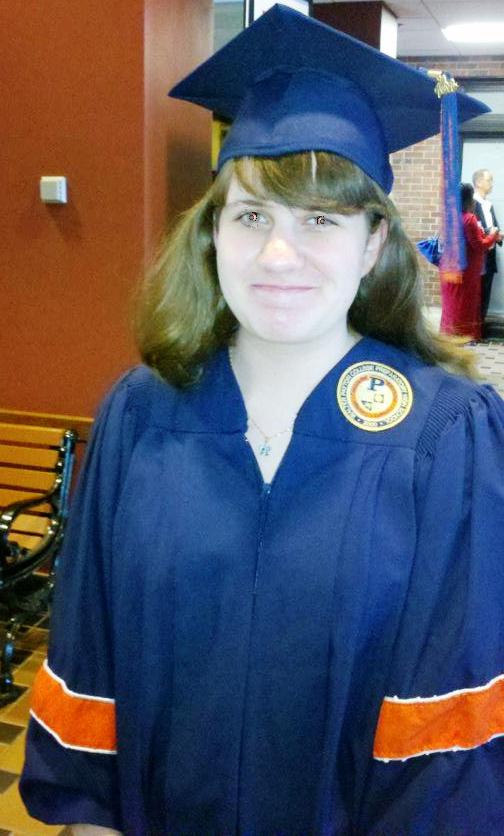
Happy Graduation Kari!
If you would like to congratulate Kari on the great work she is doing on speech, as well as outreach please leave a comment below. If you would like to join YADA please visit the support group on Facebook.
sorensonwhoube1981.blogspot.com
Source: https://pursuitofresearch.org/2012/07/10/a-voice-for-a-teen-who-grew-up-with-apraxia/